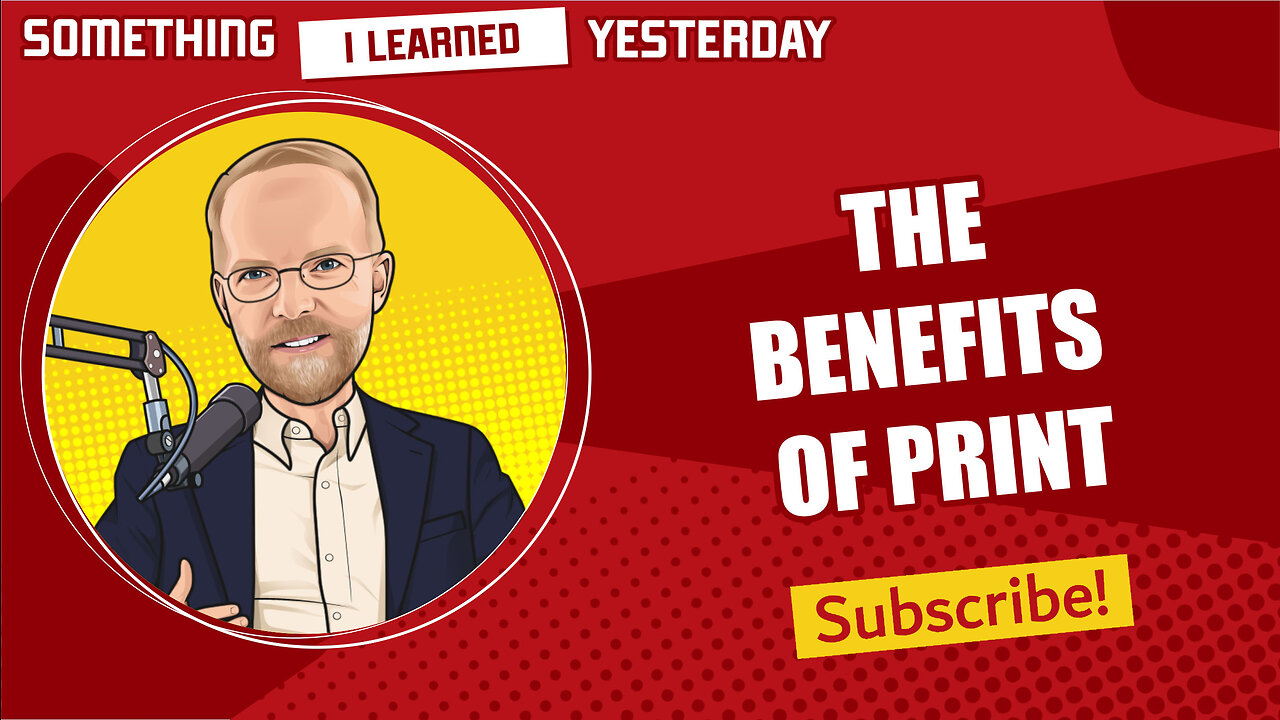Premium Only Content

Reasons to reconsider print
You don’t have to be a Luddite to see the value in print
Bo Sacks has distributed a few articles recently on print publications. I’ll link them below. Some publishers are wondering if there might be a resurgence of print. “Resurgence” sounds like too optimistic of a word to me. I think, rather, that people are starting to understand that all the “death of print” and “digital transformation” talk was a little hyped.
Print will continue to have an important, but smaller, place in the publishing world.
But why? Why will print endure?
Print and digital both have their strengths and weaknesses, but I think we’re starting to forget the advantages of a print publication, so I’m going to review some of them briefly today.
I’m not calling for a return to print or anything silly like that. I’m just pointing out that print still has an important place in some cases.
The first thing that comes to mind is that Google isn’t watching over my shoulder when I'm reading a magazine. That’s not a trivial issue.
Print publications have better aesthetics.
- Images are sharper, and can be bigger.
- There are more design and typography options.
- A print publication can have different types of paper.
- Print can appeal to other senses, like the smell of the page or the sound of the page turning.
A print magazine curates the material to create an immersive experience. It puts everything in a well-designed order and format. A print publication can be much more expertly and beautifully designed than a website.
Something is lost when articles lose their position within the larger structure. A rough analogy is the vinyl LP, where you play all the songs in the order that the artist has selected rather than just having all the songs in whatever order you want. There are benefits to both, of course.
The tactile experience of flipping through a magazine is enjoyable, and it can’t be reproduced digitally. And it’s very goofy when people try to do it.
There’s less eye strain with a print publication.
There are fewer distractions when you’re reading print. There are no notifications screaming at you every 20 seconds. So it’s easier to focus when you’re reading print.
Print is very portable, and it doesn’t require the internet. On the other hand, I can carry 1,000 books with me in a kindle.
Studies allegedly show that you comprehend what you read in print a lot better. Some of that might be because you’re involving more of your senses in the experience.
Highlighting and note taking is very different in print and digital. If I highlight something in a book, I can go back and see the highlights very easily. On the other hand, it’s harder to copy the text.
A print publication can’t be scraped by AI bots. At least not as easily.
Print is far better for children. It absolutely kills me when I see kids with smartphones, but when I see a kid with a book, it makes me happy.
A print publication has limited availability, and could be collectible. Despite the silliness about NFTs, web pages are not collectible.
Finally, reading print is more relaxing.
What should publishers take from all this?
A lot of the benefits that I’ve mentioned only apply to certain kinds of writing. For some things, I really do just want to read the words on a screen and be done with it.
But if the benefits I’ve mentioned seem to fit better with the content you produce, and the experience you want to provide, reconsider print.
Resources
Grub Street’s Jo Cummings and Peter Houston: What kind of idiots still make magazines?
https://voices.media/grub-streets-jo-cummings-and-peter-houston-what-kind-of-idiots-still-make-magazines/
Print's not dead: the best magazines for graphic design inspiration
https://www.creativeboom.com/resources/prints-not-dead-the-best-magazines-for-graphic-design-inspiration/
Elle magazine returns to print as ‘readers tire of digital deluge’
https://www.smh.com.au/business/companies/elle-magazine-returns-to-print-as-readers-tire-of-digital-deluge-20230915-p5e4za.html
-
 2:12:17
2:12:17
Tucker Carlson
6 hours agoMike Benz Takes Us Down the USAID Rabbit Hole (It’s Worse Than You Think)
155K279 -
 1:47:17
1:47:17
Roseanne Barr
10 hours ago $24.95 earnedThe Most Offensive Comic, Leonarda Jonie | The Roseanne Barr Podcast #86
93.6K77 -
 4:17:42
4:17:42
Joker Effect
7 hours agoRumble Community Night. Reviewing Rumble partnership program, it's streamers and community discussion.
61.9K14 -
 2:29:56
2:29:56
Laura Loomer
8 hours agoEP100: MAGA Goes Scorched Earth On USAID
60.2K45 -
 51:45
51:45
Talk Nerdy 2 Us
9 hours ago🔥 Talk Nerdy 2 Us – Feb 7th: HACKED, TRACKED & UNDER ATTACK! 🔥
47.1K5 -
 58:33
58:33
Man in America
15 hours agoFluoride & the Sinister Plot to Poison Us From Birth w/ Larry Oberheu
53.3K21 -
 3:41:30
3:41:30
I_Came_With_Fire_Podcast
16 hours ago🔥USAID SCANDAL | MA-GAZA | Cartel VIOLENCE Ramps Up🔥
56.4K8 -
 7:57:34
7:57:34
SpartakusLIVE
10 hours agoShadow BANNED, but we PARTY ON || Friday Night HYPE
62.9K2 -
 2:00:53
2:00:53
Omar Elattar
8 hours agoGRANT CARDONE: “Will I Run for Governor?” | Trump EXPOSED | Bitcoin | $500 Billion Crisis!
43.5K8 -
 46:48
46:48
Glenn Greenwald
11 hours agoGlenn Takes Your Questions On Gaza, USAID, and More | SYSTEM UPDATE #403
81.7K49